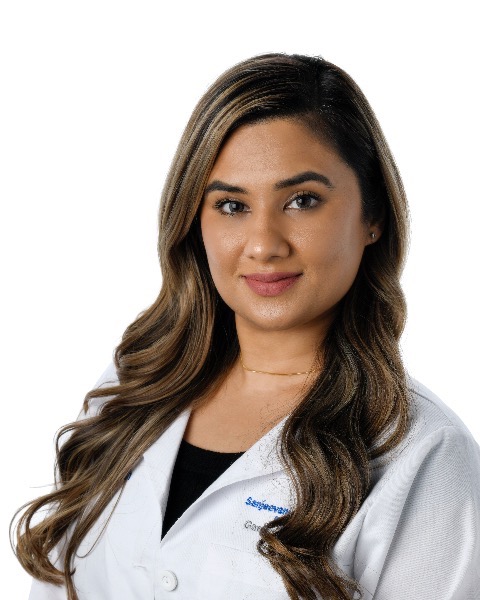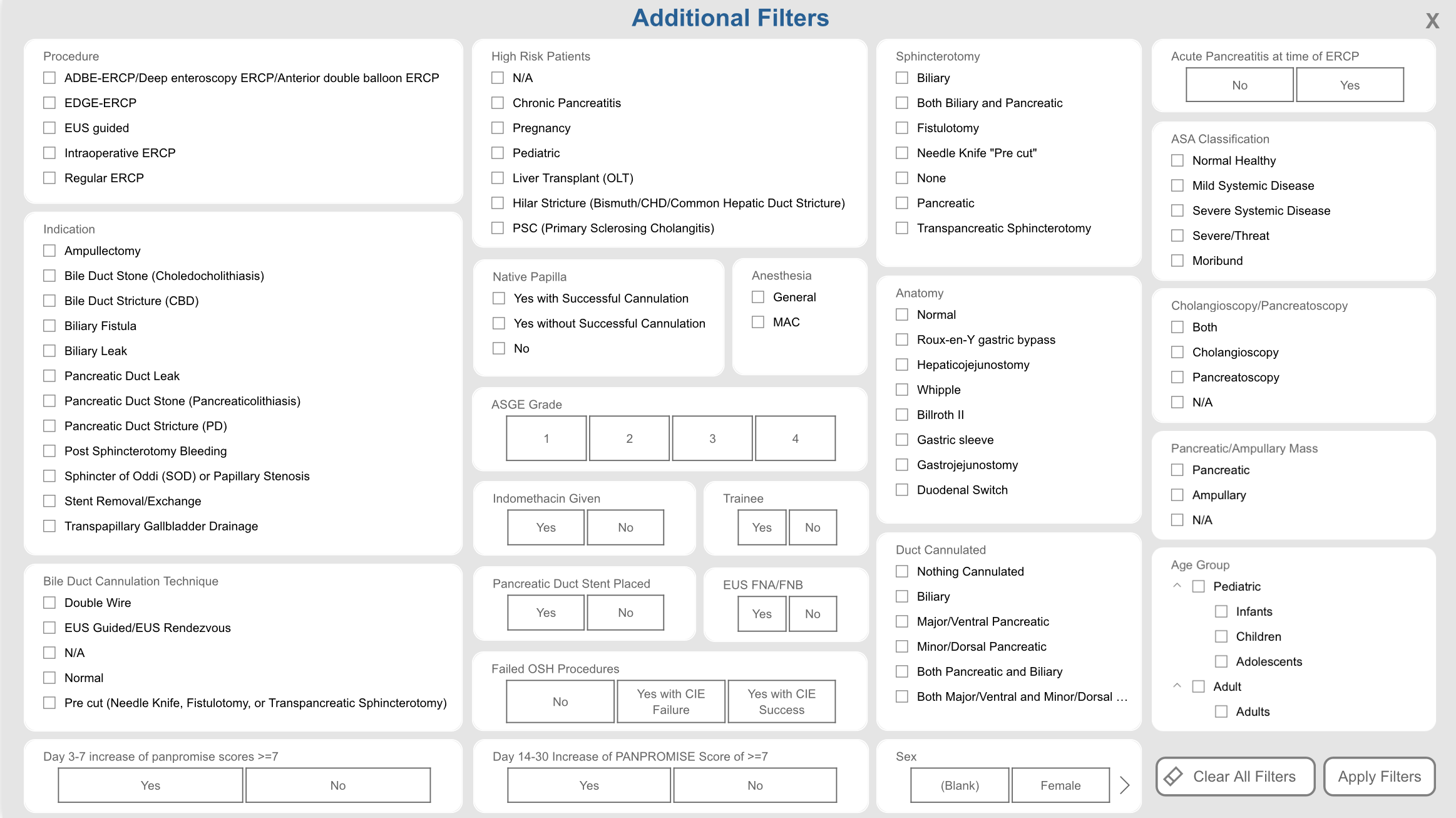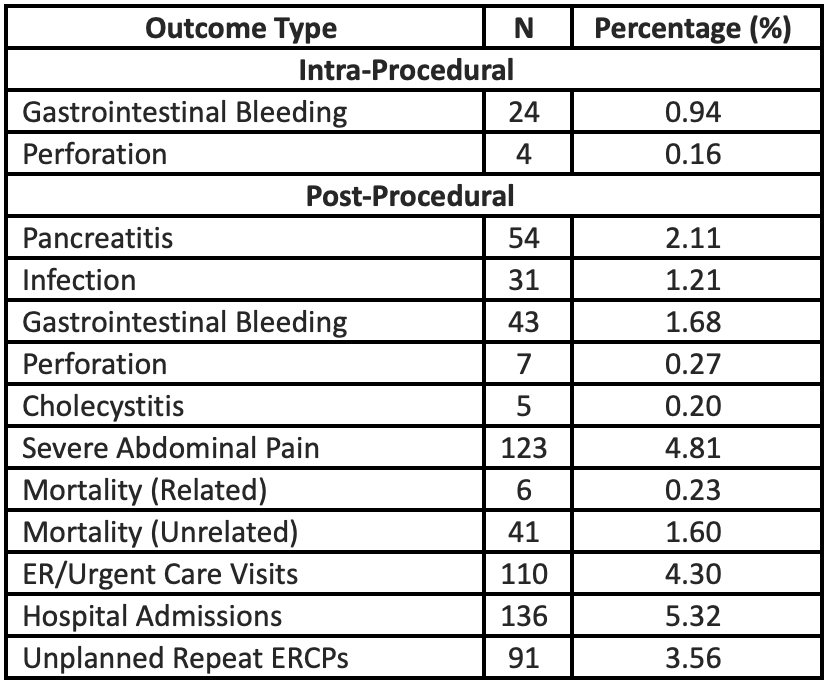Monday Poster Session
Category: Interventional Endoscopy
P3513 - Measuring and Assessing ERCP Patient Outcomes Using a Power BI Dashboard
Monday, October 27, 2025
10:30 AM - 4:00 PM PDT
Location: Exhibit Hall

Sanjeevani Tomar, MD
AdventHealth Orlando
Orlando, FL
Presenting Author(s)
Sanjeevani Tomar, MD1, Abdullah Abbasi, MD2, Saurabh Chandan, MD2, Sagar J.. Pathak, MD2, Harsimran Kalsi, MD3, Maham Hayat, MD2, Deepanshu Jain, MD2, Kambiz Kadkhodayan, MD2, Dennis Yang, MD, FACG4, Mustafa Arain, MD2, Irteza Inayat, MD5, Muhammad Hasan, MD, FACG2, Natalie Cosgrove, MD2
1AdventHealth Orlando, Orlando, FL; 2Center for Interventional Endoscopy, AdventHealth Orlando, Orlando, FL; 3University of Central Florida, Gainesville, FL; 4Center for Interventional Endoscopic, AdventHealth Orlando, Orlando, FL; 5Department of Gastroenterology and Hepatology, Adventhealth Orlando, Orlando, FL
Introduction: Endoscopic retrograde cholangiopancreatography (ERCP) is a complex procedure with risk of delayed complications and morbidity. Guidelines recommend assessment of post-procedure outcomes, however these metrics are not easily obtained, and post-ERCP delayed adverse events (DAE) are likely underestimated. To address this, our institution developed a patient outcomes based ERCP quality dashboard.
Methods: Data were prospectively collected for all ERCPs performed at a quaternary care center from April 1, 2024, to March 31, 2025, excluding EUS-guided choledochoenterostomy cases. Proceduralists documented key data in ProVation using custom-required fields. Data abstractors reviewed medical records and conducted follow-up calls at 3–7 and 14–30 days post-procedure. Data was integrated into a Power BI dashboard with filters for proceduralist, encounter type, patient- and procedure-related risk factors, and preventive measures for adverse events (Image 1). Reported outcomes included intraprocedural and delayed adverse events, ER/urgent care visits, hospital admissions, and repeat ERCPs within 14 days. Proceduralists were given view-only access to the dashboard.
Results: A total of 2,557 ERCP procedures were analyzed. The native papilla cannulation success rate was 98.9%. Intraprocedural complications included gastrointestinal bleeding (0.94%) and perforation (0.16 %). DAE included pancreatitis (2.11%), infection (1.21%), GI bleeding (1.68%), perforation (0.27%), cholecystitis (0.20%), severe pain (4.81%), and related mortality (0.23%) (Table 1). Related post-procedure care included ER/urgent care visits (4.30%), hospital admissions (5.32%), and unplanned repeat ERCPs (3.56%).
Discussion: Our ERCP quality dashboard facilitates robust assessment of post-procedure outcomes. Key strengths include reduced bias from physician self-reporting, ability to filter outcomes by notable patient and procedure specific risk factors, and inclusion of DAE in patients who sought care outside the health center. Limitations include need for abstractor manual data review. Future efforts will focus on developing methods of automating data collection and leveraging the dashboard to identify and monitor specific areas of ERCP quality improvement.

Figure: Image 1: Dashboard patient and procedure related filters

Figure: Table 1: ERCP-Related Outcomes
Disclosures:
Sanjeevani Tomar indicated no relevant financial relationships.
Abdullah Abbasi indicated no relevant financial relationships.
Saurabh Chandan indicated no relevant financial relationships.
Sagar Pathak indicated no relevant financial relationships.
Harsimran Kalsi indicated no relevant financial relationships.
Maham Hayat indicated no relevant financial relationships.
Deepanshu Jain indicated no relevant financial relationships.
Kambiz Kadkhodayan indicated no relevant financial relationships.
Dennis Yang: 3D-Matrix – Consultant. Apollo Endosurgery – Consultant. ERBE – Consultant. Fujifilm – Consultant. Medtronic – Consultant. MicroTech – Consultant. Olympus – Consultant.
Mustafa Arain: Boston Scientific – Consultant. Cook Endoscopy – Consultant. Olympus – Consultant.
Irteza Inayat indicated no relevant financial relationships.
Muhammad Hasan: Boston Scientific – Consultant. MicroTech Endoscopy – Consultant. Olympus America – Consultant.
Natalie Cosgrove indicated no relevant financial relationships.
Sanjeevani Tomar, MD1, Abdullah Abbasi, MD2, Saurabh Chandan, MD2, Sagar J.. Pathak, MD2, Harsimran Kalsi, MD3, Maham Hayat, MD2, Deepanshu Jain, MD2, Kambiz Kadkhodayan, MD2, Dennis Yang, MD, FACG4, Mustafa Arain, MD2, Irteza Inayat, MD5, Muhammad Hasan, MD, FACG2, Natalie Cosgrove, MD2. P3513 - Measuring and Assessing ERCP Patient Outcomes Using a Power BI Dashboard, ACG 2025 Annual Scientific Meeting Abstracts. Phoenix, AZ: American College of Gastroenterology.
1AdventHealth Orlando, Orlando, FL; 2Center for Interventional Endoscopy, AdventHealth Orlando, Orlando, FL; 3University of Central Florida, Gainesville, FL; 4Center for Interventional Endoscopic, AdventHealth Orlando, Orlando, FL; 5Department of Gastroenterology and Hepatology, Adventhealth Orlando, Orlando, FL
Introduction: Endoscopic retrograde cholangiopancreatography (ERCP) is a complex procedure with risk of delayed complications and morbidity. Guidelines recommend assessment of post-procedure outcomes, however these metrics are not easily obtained, and post-ERCP delayed adverse events (DAE) are likely underestimated. To address this, our institution developed a patient outcomes based ERCP quality dashboard.
Methods: Data were prospectively collected for all ERCPs performed at a quaternary care center from April 1, 2024, to March 31, 2025, excluding EUS-guided choledochoenterostomy cases. Proceduralists documented key data in ProVation using custom-required fields. Data abstractors reviewed medical records and conducted follow-up calls at 3–7 and 14–30 days post-procedure. Data was integrated into a Power BI dashboard with filters for proceduralist, encounter type, patient- and procedure-related risk factors, and preventive measures for adverse events (Image 1). Reported outcomes included intraprocedural and delayed adverse events, ER/urgent care visits, hospital admissions, and repeat ERCPs within 14 days. Proceduralists were given view-only access to the dashboard.
Results: A total of 2,557 ERCP procedures were analyzed. The native papilla cannulation success rate was 98.9%. Intraprocedural complications included gastrointestinal bleeding (0.94%) and perforation (0.16 %). DAE included pancreatitis (2.11%), infection (1.21%), GI bleeding (1.68%), perforation (0.27%), cholecystitis (0.20%), severe pain (4.81%), and related mortality (0.23%) (Table 1). Related post-procedure care included ER/urgent care visits (4.30%), hospital admissions (5.32%), and unplanned repeat ERCPs (3.56%).
Discussion: Our ERCP quality dashboard facilitates robust assessment of post-procedure outcomes. Key strengths include reduced bias from physician self-reporting, ability to filter outcomes by notable patient and procedure specific risk factors, and inclusion of DAE in patients who sought care outside the health center. Limitations include need for abstractor manual data review. Future efforts will focus on developing methods of automating data collection and leveraging the dashboard to identify and monitor specific areas of ERCP quality improvement.

Figure: Image 1: Dashboard patient and procedure related filters

Figure: Table 1: ERCP-Related Outcomes
Disclosures:
Sanjeevani Tomar indicated no relevant financial relationships.
Abdullah Abbasi indicated no relevant financial relationships.
Saurabh Chandan indicated no relevant financial relationships.
Sagar Pathak indicated no relevant financial relationships.
Harsimran Kalsi indicated no relevant financial relationships.
Maham Hayat indicated no relevant financial relationships.
Deepanshu Jain indicated no relevant financial relationships.
Kambiz Kadkhodayan indicated no relevant financial relationships.
Dennis Yang: 3D-Matrix – Consultant. Apollo Endosurgery – Consultant. ERBE – Consultant. Fujifilm – Consultant. Medtronic – Consultant. MicroTech – Consultant. Olympus – Consultant.
Mustafa Arain: Boston Scientific – Consultant. Cook Endoscopy – Consultant. Olympus – Consultant.
Irteza Inayat indicated no relevant financial relationships.
Muhammad Hasan: Boston Scientific – Consultant. MicroTech Endoscopy – Consultant. Olympus America – Consultant.
Natalie Cosgrove indicated no relevant financial relationships.
Sanjeevani Tomar, MD1, Abdullah Abbasi, MD2, Saurabh Chandan, MD2, Sagar J.. Pathak, MD2, Harsimran Kalsi, MD3, Maham Hayat, MD2, Deepanshu Jain, MD2, Kambiz Kadkhodayan, MD2, Dennis Yang, MD, FACG4, Mustafa Arain, MD2, Irteza Inayat, MD5, Muhammad Hasan, MD, FACG2, Natalie Cosgrove, MD2. P3513 - Measuring and Assessing ERCP Patient Outcomes Using a Power BI Dashboard, ACG 2025 Annual Scientific Meeting Abstracts. Phoenix, AZ: American College of Gastroenterology.
